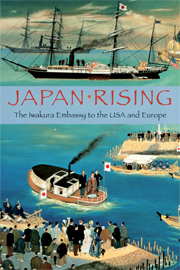Book contents
- Frontmatter
- Contents
- Introduction by Ian Nish
- Note on the Text
- VOLUME I THE UNITED STATES OF AMERICA
- VOLUME II BRITAIN
- VOLUME III CONTINENTAL EUROPE, 1
- 41 A Survey of France
- 42 A Record of Paris, 1
- 43 A Record of Paris, 2
- 44 A Record of Paris, 3
- 45 A Record of Paris, 4
- 46 A Record of Paris, 5
- 47 A Record of Paris, 6
- 48 A Record of Paris, 7
- 49 A Survey of Belgium
- 50 A Record of Belgium, 1
- 51 A Record of Belgium, 2
- 52 A Survey of Holland
- 53 A Record of the Hague, Rotterdam and Leiden
- 54 A Record of Amsterdam
- 55 A Survey of Prussia
- 56 The Journey by Rail Through Western Prussia
- 57 A Survey of Berlin
- 58 A Record of Berlin, 1
- 59 A Record of Berlin, 2
- 60 A Record of Berlin, 3; with a Supplement on Potsdam
- VOLUME IV CONTINENTAL EUROPE, 2
- VOLUME V CONTINENTAL EUROPE, 3; AND THE VOYAGE HOME
- Index
52 - A Survey of Holland
Published online by Cambridge University Press: 04 August 2010
- Frontmatter
- Contents
- Introduction by Ian Nish
- Note on the Text
- VOLUME I THE UNITED STATES OF AMERICA
- VOLUME II BRITAIN
- VOLUME III CONTINENTAL EUROPE, 1
- 41 A Survey of France
- 42 A Record of Paris, 1
- 43 A Record of Paris, 2
- 44 A Record of Paris, 3
- 45 A Record of Paris, 4
- 46 A Record of Paris, 5
- 47 A Record of Paris, 6
- 48 A Record of Paris, 7
- 49 A Survey of Belgium
- 50 A Record of Belgium, 1
- 51 A Record of Belgium, 2
- 52 A Survey of Holland
- 53 A Record of the Hague, Rotterdam and Leiden
- 54 A Record of Amsterdam
- 55 A Survey of Prussia
- 56 The Journey by Rail Through Western Prussia
- 57 A Survey of Berlin
- 58 A Record of Berlin, 1
- 59 A Record of Berlin, 2
- 60 A Record of Berlin, 3; with a Supplement on Potsdam
- VOLUME IV CONTINENTAL EUROPE, 2
- VOLUME V CONTINENTAL EUROPE, 3; AND THE VOYAGE HOME
- Index
Summary
Holland also goes by the name of The Netherlands, and to us in Japan the country is known as ‘Oranda’. Today it is one of the smaller nations in Europe. Three hundred years ago the Dutch sailed overseas, establishing colonies in various parts of the world, and Holland's power was unchecked. This was followed by a period of decline and disorder as many of these territories were taken over by Britain, but Holland still holds colonies in the East and West Indies and Africa. Among these, Java serves as the administrative capital of the Dutch East Indies, and it was from here that, over the last two centuries, a single merchant ship was dispatched each year to Japan. As our country had rejected diplomatic ties during this period and Holland was the only nation allowed to send vessels to our shores, the Dutch made vast profits through their control of all Japanese products reaching Europe.
Spread over the earth is an array of nations inhabited by peoples with diverse customs and lifestyles who present as magnificent a display as a hundred flowers in bloom. While countries in Europe resemble one another in their shared political roots, it is in their ways of life that the differences between them lie. We had already seen how the Belgians struggle to gain independence in a land of plains comparable in size with the island of Tsukushi [an archaic name for Kyūshū].
- Type
- Chapter
- Information
- Japan RisingThe Iwakura Embassy to the USA and Europe, pp. 273 - 276Publisher: Cambridge University PressPrint publication year: 2009



